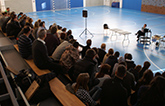 30 October 2012, Belgrade
30 October 2012, Belgrade
The International School of Belgrade was opened in 1948 by the wife of the then British ambassador. Today the school caters to 356 students from a diverse range of national and cultural backgrounds.
60 of those students today gathered to listen to Belgrade Liaison Officer Morgiana Brading talk about the work of the ICTY. Before the presentation began, the School Principal explained that the students often have heated debates in class on topics such as genocide and the NATO bombing of Serbia. The teachers are supportive of broaching controversial issues and hoped that a presentation on the Tribunal would prove extremely valuable for both students and staff.
The audience was particularly interested in the mandate of the Tribunal and asked in great detail about the definitions of different crimes. Morgiana talked at length on this subject, focusing on the issues and problems prosecutors face when having to prove the crime of genocide.
But probably the most important question came at the end: what benefits does Serbian society accrue from the Tribunal’s work?
Morgiana explained that the benefits are manifold. Facts established before the Tribunal constitute part of a historical record of what happened in during the Balkan wars, and as such play a key role in dealing the past, one of the key challenges for societies emerging from conflict. And, vitally, the Tribunal prosecutes only individuals, thereby preventing blame from being placed on peoples or nations. This helps remove a burden from the rest of society - especially the younger generations – allowing them to move into the future without being dragged down by the past.

